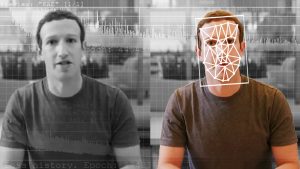Culturally, technology is a keyword that is often misconstrued and misrepresented. Keyword author Jennifer Daryl Slack asserts that technology is seen largely as a “measure of progress” and the “promise of a good life”, when in reality this result is dependent upon its “intentions… and relations of power at stake”. Because it is in our nature to be attracted to new, shiny “things”, we many times fail to recognize its perversion of knowledge and human behavior. One pervasive disadvantage has been misinformation. In Pew Research’s article, “Tech causes more problems than it solves”, Greg Shatan, a lawyer with Moses & Singer LLP, suggests that “the instinctual BS-meter is not enough. The next version of the ‘BS-meter’ will need to be technologically based” (Vogels et al., 2020). Overall, AI and large-scale companies have gotten more and more advanced in creating deep fakes and presenting information in a realistic looking way that it has become exhausting to find the “truth”. Thus, misinformation has had drastic influences on our essential systems such as public health and democracy. The deep-web Qanon group uses misinformation and spreads hateful ideologies behind the guise of truth. This group has influenced the number of vaccinated people in the United States and therefore has contributed to the longevity of COVID-19 and the death rate in underrepresented communities. Overwhelmingly, this phenomenon continues to have a devastating effect on modern politics and the ways in which we obtain and interpret information.
References:
Vogels, E. A., Rainie, L., & Anderson, J. (2020, October 23). 5. tech causes more problems than it solves. Pew Research Center: Internet, Science & Tech. Retrieved September 29, 2021, from https://www.pewresearch.org/internet/2020/06/30/tech-causes-more-problems-than-it-solves/.

CNBC’s “What are ‘deepfakes’ and how they might be dangerous”

I think you make a really interesting point about the effect of technology on the circulation of information. Oftentimes people tend to assume the first thing they hear is true, and technological advancements have created a culture that assumes information is verified before it is presented to a wider audience. As you explained with the QAnon example, this is simply not true. However, people seem to have a steadily decreasing interest in verifying this information themselves, or even seeking out any information. This lack of knowledge and awareness about the entire truth is something technology seems to contribute to, especially since, as technologies improve, things like deepfakes become harder to verify or debunk.